Skin conditions
Showing all 11 results
-

Warts/Verrucas
£35.00 Read moreHave a Wart/Verruca? Let us help you.
What is a Wart/Verruca?
Warts are generally harmless, and they occur due to the human papillomavirus (HPV). They are not particularly attractive. Even though they frequently heal on their own without any help, sometimes treating them helps the healing process. Although you need close skin-to-skin contact to transfer the virus, it can also be spread by contact with an already contaminated surface.
Warts are little bumps on your skin that have a cauliflower type of appearance. Most of the time, they grow them on your hands or feet, and you may only have one or several may develop simultaneously. A verruca is what grows on your foot. There are numerous varieties of warts, and this will impact their appearance and accompanying symptoms.
-
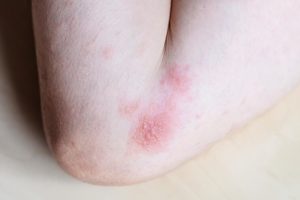
Shingles
£35.00 Read moreWorried you have Shingles? Let us help you.
What is Shingles?
Shingles, also known as herpes zoster, is a viral infection brought on by the chickenpox virus that affects a nerve and the skin around it. As a result, the affected area develops blistered itchy, painful rash. Only people who have previously experienced chickenpox can get shingles.
The virus stays in the nerves after the initial infection and causes shingles when it reawakens in one specific nerve. After the initial chickenpox infection, this can occur years or even decades later. The virus frequently re-emerges in these ways in patients with compromised immune systems, however it is unclear why. The duration of each case of shingles might range from a few weeks to a month.
Although there is no known cure for shingles, there are several therapies that can help make the discomfort it causes more bearable. You should speak to our clinician or your GP right away if you suspect that you have shingles.
-

Scabies
£35.00 Read moreWorried you have Scabies? Let us help you.
What is Scabies?
Scabies is an itchy skin ailment caused by Sarcoptes scabiei, a small burrowing mite. Itching is severe in the region where the mite burrows. The need to itch may be particularly severe at night.
It is infectious and can spread swiftly in a household, child nursery, school class, nursing facility, or jail through close physical contact. Because scabies is extremely infectious, doctors frequently urge that whole families or contact groups be treated.
Scabies is easily treatable. Scabies mites and their eggs are killed by medications applied to the skin. However, you may have irritation for several weeks following therapy.
-

Urticaria (Hives)
£35.00 Read moreSuffering from Urticaria? Let us help you.
What is Urticaria?
Urticaria, (is also known as welts, hives, nettle rash or weal’s) is a raised, itchy, red rash caused by fluid leaking from blood vessels immediately beneath the skin’s surface. It may arise on a single section of the body or it may cover a greater area. The rash may change within 24 hours, but generally settles within a few days. Urticaria can be acute (lasting less than six weeks) or chronic (lasting six weeks or longer). It can be triggered by a variety of factors, including allergic reactions, infections, stress, or physical stimuli like heat or cold.
-
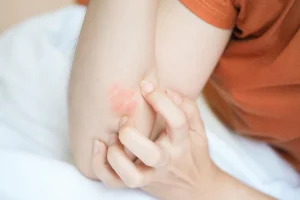
Fungal Skin Infection (Athlete’s foot, Ringworm and Intertrigo)
£35.00 Read moreSuspecting Fungal Infection? Let us help you.
What is a Fungal skin Infection?
Fungal skin infections are caused by fungi that invade and grow in the skin, nails, or hair. These infections are common and can affect different parts of the body, leading to various symptoms like itching, redness, and rashes. Fungal infections can be superficial, affecting the skin and mucous membranes, or more deep-seated, affecting other body tissues. Fungal infections include athlete’s foot, ringworm, and intertrigo rashes. Fortunately, these infections are frequently treatable, and our clinicians will be able to explain what you can do to prevent them from recurring. It is very common to develop fungal infections on the folds of the skin (e.g. under breasts) and public places are the main place you can become infected.
-

Fungal Nail Infection (Tinea Unguium or Onychomycosis)
£35.00 Read moreSuffering from fungal Nail Infection? Let us help you
What is a Fungal Nail Infection?
A fungal nail infection (Tinea Unguium or Onychomycosis) is caused by fungus invasion . If left untreated, it leads to unsightly, larger nails that can be painful. This fungus can live on your skin without harming you, but if given the right conditions (they favour warm, wet settings), it can proliferate and cause illness.
The majority of fungal nail infections are harmless, although they can be difficult to treat. The illness can affect either your toe or fingernails, and it usually begins slowly with few symptoms. The nail, however, may become discoloured or distorted as the fungus multiplies and spreads, causing pain while walking or wearing tight shoes.
-

Folliculitis
£35.00 Read moreSuffering from Folliculitis? Let us help you
What is Folliculitis?
Folliculitis is a skin disorder where the hair follicles become infected, which results in tender, red spots called pustules on the skin’s surface. Folliculitis is the result of ingrowing hairs; the grown hair curls back on itself and the follicles becomes infected. Staphylococcus aureus is the most common organism that causes folliculitis (S. aureus). A fungus or other foreign bodies detected on the skin can sometimes cause it as well. While folliculitis is generally not serious, it can be uncomfortable and, if left untreated, can lead to more severe infections or complications like scarring.
-
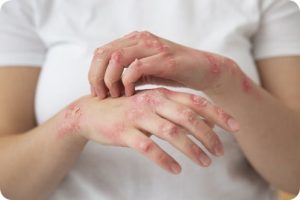
Psoriasis
£35.00 Read moreSuffering from Psoriasis? Let us help you
What is Psoriasis?
Psoriasis is a chronic autoimmune skin condition that causes the rapid buildup of skin cells, leading to scaling on the skin’s surface on the knees, elbows, trunk, and scalp. Inflammation and redness around the scales are common, and the condition can range from mild to severe.
Psoriasis is not contagious, but it is a lifelong condition with no cure that can have significant physical and emotional effects. It can be uncomfortable and can affect your everyday life. The problem tends to flare up for a few weeks or months, then can subside for a while. Infections, burns and certain medicines are common triggers in patients who have a hereditary susceptibility to psoriasis. There are treatments available for managing symptoms. You can also experiment with different lifestyle habits and coping skills to help you live a better life with psoriasis.
-
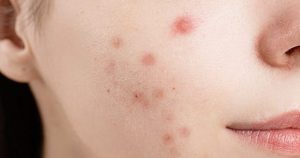
Acne Vulgaris
£35.00 Read moreSuffering from Acne? Let us help you.
What is Acne?
Acne, or acne vulgaris, a very common skin condition, which affects most people at some point in their lives. Hair follicles become blocked with dead skin cells and oils, which leads to the development of various types of spots. The areas affected are usually on your face, back, shoulders and chest. Generally, acne occurs during puberty due to raised hormone testosterone levels, which subsides in late teens to early twenties. Adult acne can occur due to fluctuating hormone levels, which is more common in women than men, and is easily treatable.
-
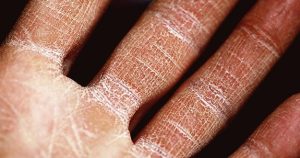
Eczema (Dermatitis)
£35.00 Read moreSuffering from Eczema? Not sure of diagnosis? Let us help you.
What is Eczema?
Eczema (also known as dermatitis) is a skin disorder that causes inflammation and itching, as well as dryness and cracking. There are various forms of eczema and the most common type is ‘atopic eczema’, which occurs on your neck, hands, elbows and knees. You get eczema in patches with atopic eczema. There is no cure for the condition, but our clinicians can help treat a flare-up, treat infected eczema and help to keep the condition under control. Eczema requires long term management as this is a chronic skin condition. It is one of the most common skin disorders, particularly in children, although it can affect people of all ages.
Eczema Causes, Symptoms and Treatment, please read below
-

Cellulitis
£35.00 Read moreSuspecting Cellulitis? Let us help you
What is Cellulitis?
Cellulitis is a common, potentially serious bacterial skin infection that affects the deeper layers of the skin, specifically the dermis and subcutaneous tissue. It occurs when bacteria, usually Streptococcus or Staphylococcus species, enter the skin through a break, such as a cut, scrape, or insect bite. Cellulitis can develop anywhere on the body, though it is most commonly found in the legs. It can affect people of all ages and genders, and it should be treated as soon as possible because it can lead to more significant health issues. If left untreated, cellulitis can spread rapidly, leading to more severe health issues, including infections of the bloodstream (sepsis) or the lymphatic system. Obesity, diabetes, poor circulation, and intravenous drug use are all factors that might raise your chances of developing cellulitis.